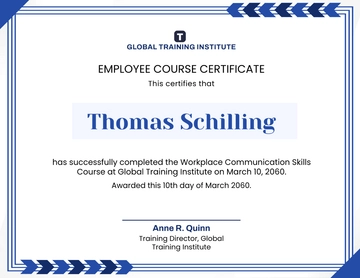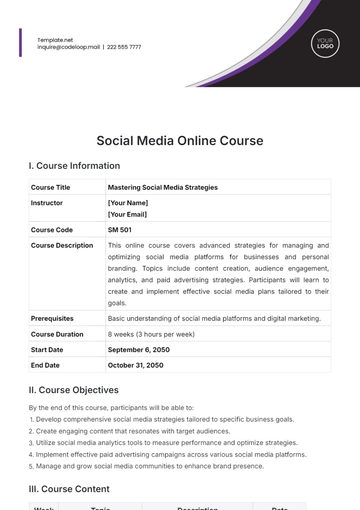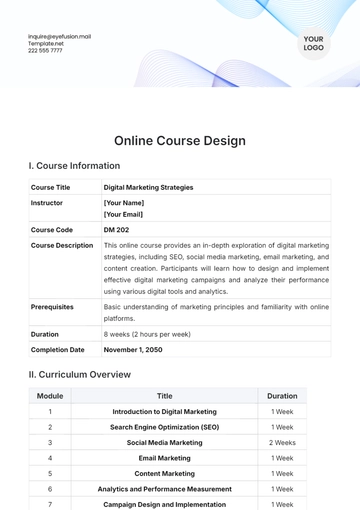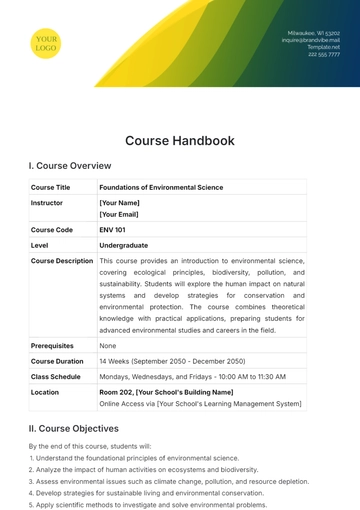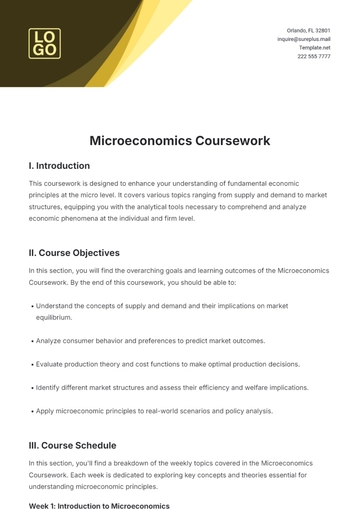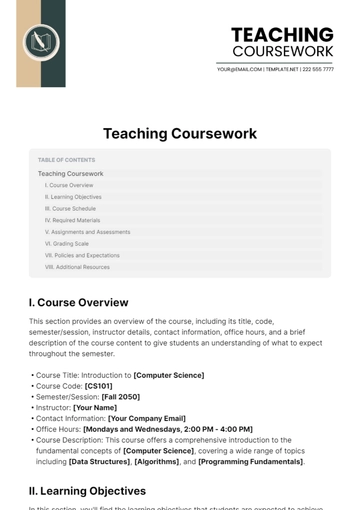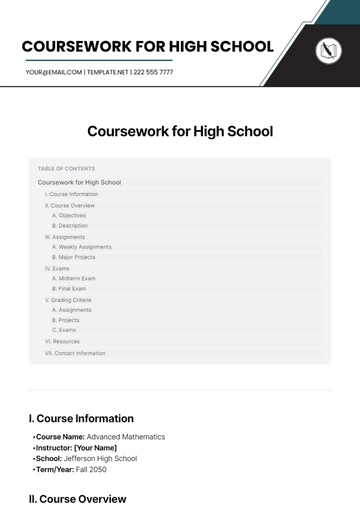Free Teaching Coursework
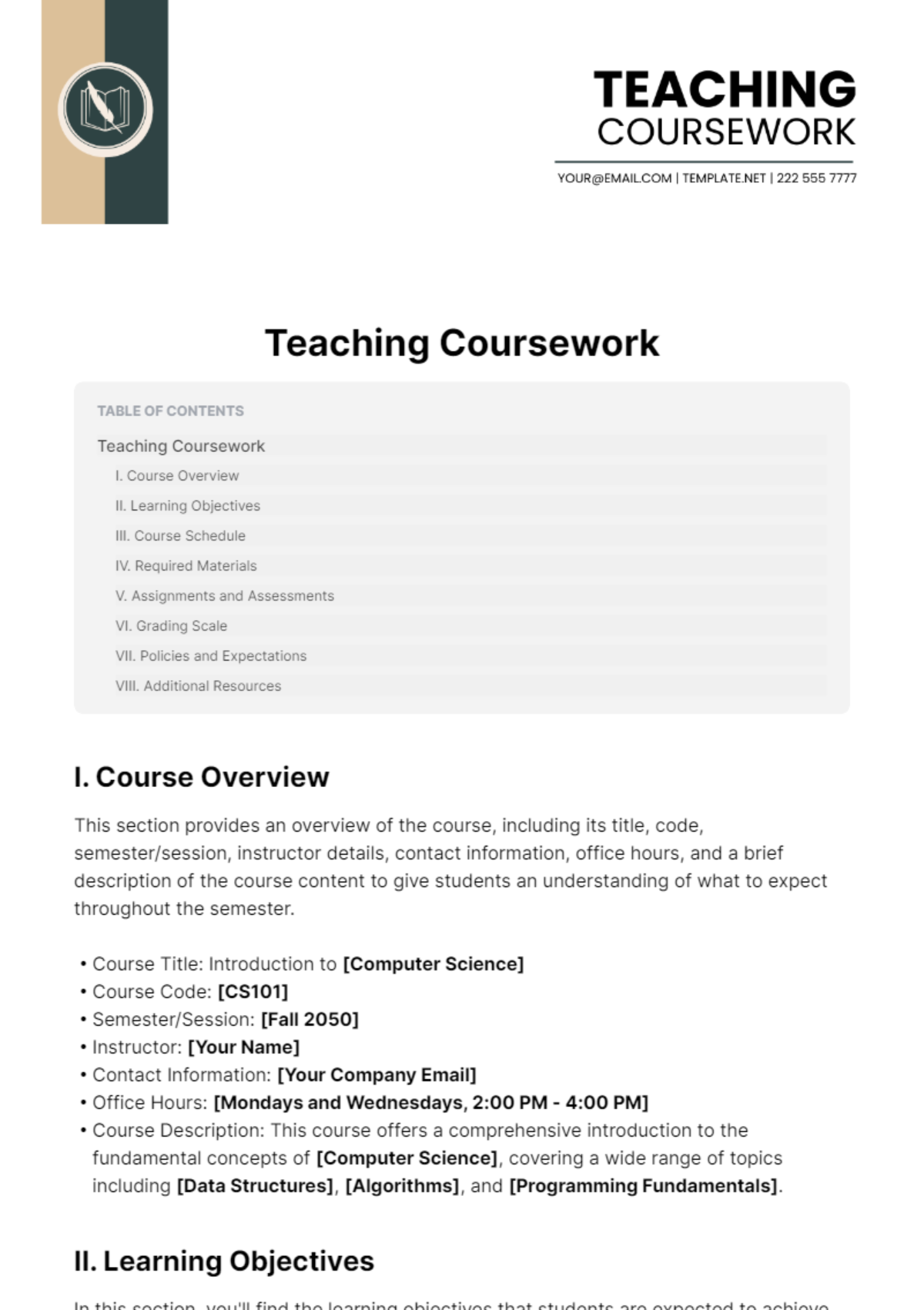
I. Course Overview
This section provides an overview of the course, including its title, code, semester/session, instructor details, contact information, office hours, and a brief description of the course content to give students an understanding of what to expect throughout the semester.
Course Title: Introduction to [Computer Science]
Course Code: [CS101]
Semester/Session: [Fall 2050]
Instructor: [Your Name]
Contact Information: [Your Company Email]
Office Hours: [Mondays and Wednesdays, 2:00 PM - 4:00 PM]
Course Description: This course offers a comprehensive introduction to the fundamental concepts of [Computer Science], covering a wide range of topics including [Data Structures], [Algorithms], and [Programming Fundamentals].
II. Learning Objectives
In this section, you'll find the learning objectives that students are expected to achieve by the end of the course, providing clear targets for their learning journey and guiding their focus throughout the semester.
By the end of this course, students should be able to:
Understand the basic principles of [Computer Science].
Analyze and solve problems related to [Data Structures].
Apply [Algorithms] concepts to real-world scenarios.
Demonstrate proficiency in [Programming Fundamentals] through projects and assignments.
III. Course Schedule
Here, you'll find a detailed schedule of the topics covered each week, along with assigned readings and assessments, allowing students to plan their study schedule effectively and stay on track with the course curriculum.
Week | Topic | Readings | Assignments/Assessments |
|---|---|---|---|
Week 1 | Introduction to [Computer Science] | [Textbook Chapter 1] | [Assignment 1 Due: October 1, 2050] |
Week 2 | [Data Structures] | [Readings or Lecture Notes] | [Quiz 1: October 8, 2050] |
Week 3 | [Algorithms] | [Readings or Lecture Notes] | [Group Project Proposal Due: October 15, 2050] |
Week [4] | Add as necessary | - | - |
IV. Required Materials
This section lists the textbooks, supplementary readings, and software/tools required for the course, ensuring that students have access to the necessary resources to support their learning journey effectively.
Textbook: Introduction to [Computer Science], by [Author], 3rd Edition
Supplementary Readings:
["Computer Science Illuminated"]
["Algorithms Unlocked"]
Software/Tools:
IDE: [Visual Studio Code or IntelliJ IDEA]
Compilers/Interpreters: [Java JDK, Python, C++, etc.]
V. Assignments and Assessments
This section provides details about assignments, quizzes, exams, and other assessments throughout the course, allowing students to understand the evaluation criteria and plan their study accordingly to achieve their academic goals.
Assignment 1: Essay on [Importance of Algorithms]
Due Date: [October 1, 2050]
Quiz 1: Multiple-choice quiz on [Data Structures]
Date: [October 8, 2050]
Group Project Proposal: Proposal for [Creating a Simple Programming Language]
Due Date: [October 15, 2050]
Midterm Exam: Comprehensive exam covering [Topics 1-4]
Date: [October 29, 2050]
Assignment 2: Research paper on [Emerging Technologies in Computer Science]
Due Date: [November 5, 2050]
Quiz 2: Short answer quiz on [Web Development Basics]
Date: [November 12, 2050]
Group Project Presentation: Presentation of [Software Engineering Project]
Date: [November 19, 2050]
Final Exam: Cumulative exam
Date: [December 3, 2050]
VI. Grading Scale
This section presents the grading scale used in the course, outlining the criteria for evaluating students' performance and determining their final grades based on their achievements throughout the semester.
Grade | Percentage Range |
|---|---|
A | 90% - 100% |
B | 80% - 89% |
C | 70% - 79% |
D | 60% - 69% |
F | Below 60% |
VII. Policies and Expectations
Here, you'll find information about attendance, late submissions, academic integrity, participation expectations, and accessibility accommodations, ensuring that students are aware of the policies and expectations set forth by the instructor to maintain a fair and conducive learning environment.
Attendance Policy: Regular attendance is expected. More than three unexcused absences may result in a grade deduction.
Late Submission Policy: Late submissions will be penalized by [5%] per day.
Academic Integrity: Plagiarism or cheating will result in disciplinary action.
Participation Expectations: Active participation in class discussions and activities is essential for learning.
Accessibility Accommodations: Please inform the instructor of any accessibility accommodations needed.
VIII. Additional Resources
This section provides additional online resources and office hours for further assistance, offering students opportunities to seek additional support and guidance outside of regular class sessions.
Online Resources: [Links to relevant websites, videos, etc.]
- 100% Customizable, free editor
- Access 1 Million+ Templates, photo’s & graphics
- Download or share as a template
- Click and replace photos, graphics, text, backgrounds
- Resize, crop, AI write & more
- Access advanced editor
Discover the ultimate teaching aid on Template.net! Our Teaching Coursework Template offers an editable and customizable solution for educators. Crafted to perfection, it's editable in our AI Editor Tool, ensuring seamless adaptation to your curriculum needs. Elevate your teaching experience effortlessly with this versatile resource.

